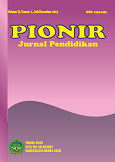ANALYSIS OF CANVA PUZZLE MEDIA NEEDS IN INDONESIAN LANGUAGE LEARNING FOR ELEMENTARY SCHOOL GRADE III
DOI:
https://doi.org/10.22373/4phcqr09Keywords:
Puzzle Media, Elementary SchoolAbstract
This study aims to develop Canva-based puzzle media for Indonesian language subjects for third-grade elementary school students using the Research and Development (R&D) method of the ADDIE model (Analysis, Design, Development, Implementation, Evaluation), but this study is limited to the development stage, so the resulting product has not yet reached the stage of implementation and comprehensive evaluation in the field. Data collection was carried out through observation, student questionnaires, and teacher interviews which showed that 74.1% of students liked Indonesian language subjects, but 55.6% found it difficult, 92.6% of students wanted more creative learning, and 51.9% were more enthusiastic about game methods. The conclusion of this study is that Canva-based puzzle media is expected to increase students' interest in learning and active participation, while providing practical solutions for teachers in overcoming low interest in learning and enriching digital learning media references.
Keywords: Puzzle Media, Elementary School
References
Adibah, F. N., Hairunnisa, S. N., Purwanto, V. D., Marini, A., & Yunus, M. (2024). Literature review of the use of Flashcard Media to improve learning outcomes IPS Elementary School students. Journal Of Scientific Horizons, 4(3), 133-144.
The Dog, Or., & Radia, E. H. (2021). Development of Learning Media Based on Cross Puzzle Game in Science Learning to Improve Learning Outcomes. Journal of Science Education Research, 7(2), 173-177. https://doi.org/10.29303/jppipa.v7i2.667
Alzanah, L., & Dewi, H. I. (2022). Creative Puzzle Development For Primary School Children Learning Media. IKRAITH Journal-humanities, 6(2), 126-135.
Amalia, D., & Napitupulu, S. (2022). Development of image Puzzle Media to improve narrative essay writing skills of fourth grade students of SD 101899 Lubuk Pakam. Edu Global: Journal Of Research ..., 01(20), 120-130.
Amelia, C. R., Usman, H., & Wardhani, P. A. (2024). Analysis of the needs for the development of Blender-based 3D Animation Video Media in PPKN subjects in Class V. Journal of Holistic Medicine, 8(1), 1. https://doi.org/10.24853/holistika.8.1.1-10
Anjani, P., & Usman, H. (2024). Analysis of teachers ' needs for digital teaching materials based on Learning Cycle 5e in elementary school. ... Journal): Journal of Education And ..., 8(2), 390-395.
The Gift of Emeralds, A., Usman, H., & Law Wardhani, P. (2024). Analysis Of Media Needs of Digital-Based Picture Story Books on Pancasila Education Content in Schools. Scientific Journal of Basic Education, 9(2), 2677-2688.
Fadilah, S. N., Fish, C. R. N., & Yasa, A. D. (2020). Development of e-Puzzle media of natural features in fourth grade students of SD Tambakasri 3. Seminar Nasional PGSD UNIKAMA, 4, 205–210.
Faidah, N., Usman, H., Yarmi, G., Jakarta, U. N., & Genre, B. (2024). Interactive E-LKPD Development Needs Analysis. 9(2), 225–233.
Fitri, A. A., Trianingsih, M., Ifadha, R. D., Marini, A., & Yunus, M. (2024). Application of scientific approach in learning IPS in elementary school. Indonesian Research Journal on Education, 5(1), 99–106.
Indrasari, M., Subiyantoro, S., & Hastuti, D. (2023). Application of Problem-Based Learning Models and Puzzle Media to Improve Students’ Learning Outcomes. Cognitive Development Journal, 1(1), 28–36.
Irmayanti, Nurjannah, N., Nurjannah, N., Heriyanti, A., Mirna, M., & Sari, F. (2023). Training and assistance in making Canva Education-Based Learning Media at MTS Nurul Izzah. AKM: action to Society, 4(1), 73-82. https://doi.org/10.36908/akm.v4i1.734
Isnaini, L. S., Mustari, M. The Gift, E., & Sawaludin, S. (2024). Implementation Of Independent Curriculum in Improving Teacher Creativity at Sman 1 Sakra. LEARNING: Journal of educational and Learning Research Innovation, 4(3), 700-710. https://doi.org/10.51878/learning.v4i3.3182
Empress, A. N. F. E. T. J., & Wardhani, Prayuningtyas Angger, H. U. (2024). Development of Number Line Board Learning Media to improve understanding of the story matter of Integer material Class VI SD. 09, 4889–4901.
Maulidya, A., Varathi, K., Marini, A., & Yunus, M. (2024). The role of social skills in encouraging student participation in learning IPS SD. Scholars of Education, 4(4), 50-54. https://doi.org/10.9644/sindoro.v3i9.252
Nurfebriyani, S., Daughter, C. H., Jamaludin, U., & Setiawan, S. (2024). Literature study: development of Puzzle Media to improve students ' reading skills in elementary school. Scientific Journal of The Educational Profession, 9(3), 1857-1863. https://doi.org/10.29303/jipp.v9i3.2442
Ramadhan, S., & Yamin, Y. (2022). Development of Crossword Puzzle Learning Media to improve Indonesian vocabulary mastery of Grade II Elementary School students. Journal Education FKIP UNMA, 8(3), 960–965. https://doi.org/10.31949/educatio.v8i3.3042
Velayati, M. A., & Prastowo, A. (2022). Growing Students’ Learning Activity Through Ict-Based Simulation Model on Online Learning in Elementary School. AULADUNA: Journal of Islamic elementary education, 9(2), 181-198. https://doi.org/10.24252/auladuna.v9i2a6.2022
Downloads
Published
Issue
Section
License
Copyright (c) 2025 Vera Juniar, Herlina Usman, Mahmud Yunus

This work is licensed under a Creative Commons Attribution-ShareAlike 4.0 International License.
- Authors retain copyright and grant the journal right of first publication with the work simultaneously licensed under a Creative Commons Attribution License that allows others to share the work with an acknowledgment of the work's authorship and initial publication in this journal.
- Authors are able to enter into separate, additional contractual arrangements for the non-exclusive distribution of the journal's published version of the work (e.g., post it to an institutional repository or publish it in a book), with an acknowledgment of its initial publication in this journal.
- Authors are permitted and encouraged to post their work online (e.g., in institutional repositories or on their website) prior to and during the submission process, as it can lead to productive exchanges, as well as earlier and greater citation of published work (See The Effect of Open Access).

